With energy prices skyrocketing in the UK, choosing an energy efficient and cost-effective home heating system is more important than ever. As the nation pushes toward sustainability goals to reduce carbon emissions by 78% by 2035, we also need environmentally responsible solutions. In 2025, what is the most affordable and practical way to heat the average British home – electric radiators or gas central heating?
Both systems have pros and cons we will analyze in this article concerning upfront expenses, annual running costs, and suitability for the UK’s temperate climate. Gas boilers currently dominate Britain’s housing market, with over 85% of homes using natural gas for heating and hot water. However, the UK plans to phase out gas heating in new homes by 2025 to meet emissions targets. With higher gas prices and electricity from cleaner sources, electric systems are becoming more financially viable.
We will crunch the numbers on factors like purchase costs, annual energy use per square meter, and lifetime equipment costs for electric and gas systems. This data will help homeowners decide which system may save more money long-term after the UK’s natural gas ban takes effect.
We’ll also consider heat output performance in damp, cold winters versus system longevity and maintenance between modern electric radiators versus condensing combi boilers. By comparing total real-world costs, our analysis aims to determine if electric radiators or gas central heating yields more bang for your buck in 2025 and beyond.
Electric Radiators vs. Gas Central Heating: Key Differences
Electric and gas heating systems operate in fundamentally different ways, which lead to trade-offs UK homeowners must consider. Electric radiators UK work by running an electrical current through heated wires or oil inside to directly produce heat. Gas central heating uses a boiler to burn natural gas to heat water, which circulates through radiators and pipes around the home.
Why Should You Pick a Cost-Effective Heating System in 2025?
In 2025, any homeowner replacing an old heating system or building a new home will face the choice between electric or gas. Electric systems have become more efficient and affordable improvements to electrical grids now allowing more renewables like solar and wind. However, gas boilers remain far more common - but come with higher and unpredictable fuel costs.
Radiator positioning also differs as electric versions can be wall mounted and customized room-by-room. Gas relies on existing pipework so adjusting layouts proves more challenging and costly. Maintenance is simpler for electrical too with little to no annual servicing required compared to the regular boiler care essential to preventing issues like leaks or carbon monoxide building with gas.
Relevance to UK Homeowners in 2025
As the UK phases out gas heating in new build homes starting in 2025, homeowners may pivot towards electric systems anyway in new constructions. But those upgrading aging boilers in existing dwellings still have these two heating routes to evaluate based on their budget, priorities around comfort and customization, and environmental sustainability. We’ll explore the costs and benefits of each option next.
Upfront Cost Comparison in 2025
Before deciding to go ahead with these two options, you need to take a look at the upfront costs.
Gas Central Heating Installation Costs
Installing or replacing a gas boiler and central heating system in your home costs between £3,000-£7,000 including the new boiler, radiators, pipes, and labour. The boiler itself ranges from £1,500 for a standard model up to £3,500 for a high-efficiency combination boiler.
You’ll also need to factor in £500-£2,000 to remove and dispose of an existing gas boiler plus installation fees for radiators, thermostats, piping and the gas supply which can add an extra £1,000 or more. Required safety measures like carbon monoxide detectors, flue venting from boiler emissions and gas safety certificates also increase initial expenses by approximately £200-300.
Electric Radiator Purchase and Setup Expenses
Electric heating allows more flexibility as you can buy affordable standalone radiators starting from £150. Larger or more advanced Wi-Fi-enabled electric designs come in around £300-600 per unit.
Because no central gas infrastructure or piping enters the equation, electric is far simpler and cheaper to install at about £300 - avoiding complex boiler, flue and radiator setup fees. The main addition would be installing a central smart thermostat (£200-300) if you want the radiators programmed to turn on and off automatically across zones.
Government Grants and Incentives
The UK government currently offers homeowners subsidies on new gas boiler installations through the Boiler Upgrade Scheme (BUS) covering £5,000 for low income households. There are also environmental incentives for heat pumps and solar thermal water heating, but no direct electric radiator rebates yet.
However, increased sustainability targets for 2025 are expected to bring new efficiency grants applicable to electric systems without the high carbon footprint of natural gas. We may see comparable government discounts on electric heating alternatives aligned with banning gas boilers from all UK new builds starting in 2025. Factor this into cost comparisons as budget bonuses for eco-friendly electric radiators are likely on the horizon.
Running Expenses Analysis: 2025 Energy Prices
Are electric radiators expensive to run? Do electric radiators use a lot of electricity? Follow this section and we will help you find answers.
Gas vs Electricity Unit Costs in 2025
Based on current projections, gas is expected to cost 8-10p per kWh for households in 2025, while electricity will range from 18-22p per kWh. Global supply issues, the Ukraine conflict, and investments in renewables impact prices. As the UK obtains more electricity from wind, solar, and other zero-carbon sources, electric costs may fall while natural gas remains tied to geopolitical factors and carbon taxes making it more expensive over time.
Energy Efficiency Comparison
A key cost factor is that electric radiators convert 100% of energy consumed into heating homes because of direct resistive heating. Meanwhile, even the most efficient A-rated gas condensing boilers only achieve 92% efficiency on average. The lost 8% wastes money as heat vented outdoors or during idling. Electric radiators avoid energy loss, meaning they can heat a properly insulated home using less overall energy.
Smart thermostats capable of controlling electric or hydronic radiator temperatures room-by-room provide further savings. Correctly sized quality radiators coupled with insulation, dual-glazed windows, and smart technology minimize unnecessary operation cutting bills significantly.
Maintenance and Repair Costs
Gas boilers require annual safety inspections and servicing costing £80-150 in parts and labor - essential for preventing dangerous carbon monoxide leaks or failures. Electric radiators have no serviceable components, functioning for up to 20 years with negligible maintenance besides occasional dusting/cleaning costing little to nothing.
Well-maintained gas boilers last from 10-15 years before needing replacement. Electric heating elements outlast other home systems with lifespans from 15-20 years. Considering a modern electric radiator system cuts out expensive gas line repairs, leaks plus boiler replacement every 10-15 years, this again saves homeowners substantial sums long-term.
Factoring in lifetime system and servicing costs over a 20 year period highlights why electric radiators yield more bang for your buck versus trouble-prone gas boilers needing far more upkeep.
Suitability for UK Homes in 2025
Are electric radiators efficient? There are few factors that you have to consider for determining the efficiency. This section can help you with that.
Home Size And Heating Demands
Larger 3+ bedroom detached and semi-detached houses with higher heat loss may still benefit more from a powerful gas boiler and extensive radiator/piping capacity. But modern electric systems increasingly suit smaller flats and properties under 150m2. Radiator positioning flexibility also helps concentrate electric heat where occupants want it.
Retrofitting Challenges
Many older UK homes built pre-1990 lack proper insulation making electrical upgrades the more practical, affordable heating renewal option. Installing brand new gas lines and radiators proves extremely disruptive and costly without extensive renovation. Electric radiators UK simply plug into existing sockets making them the simplest retrofit - especially in heritage homes with layout or construction challenges.
Regional Energy Infrastructure
Access to mains gas depends on location as rural regions have less pipeline infrastructure. 30% of rural homes remain off the gas grid entirely hence electric and alternative systems dominate there already. In urban areas with both gas and electric, fuel prices and home layout now mainly drive choices rather than supply availability in most regions.
Off-grid rural properties can utilize electric more easily through solar panels or generators eliminating the need to truck in fossil fuel tanks. Eco-friendly heat pumps are also surging in suitable UK dwellings for heating and hot water aligned with 2025 emission reduction mandates.
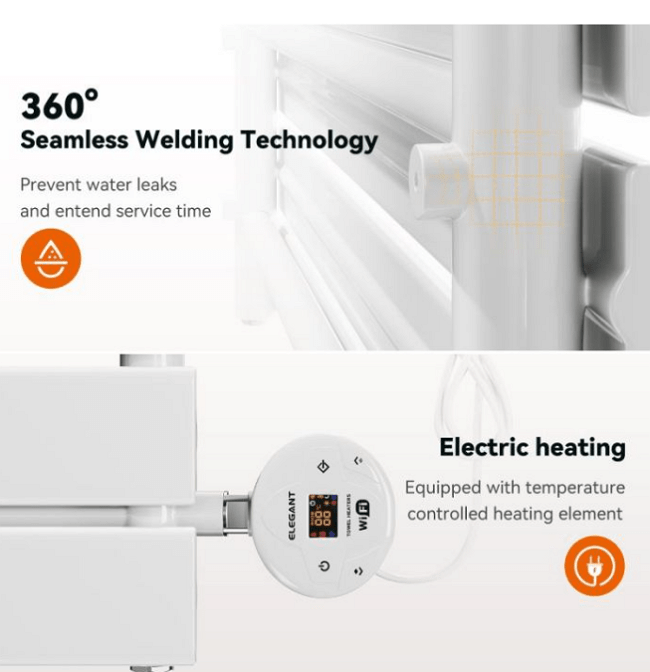
Environmental Impact and 2025 Regulations
The UK government aims to cut economy-wide carbon emissions by 78% by 2035 from 1990 levels under its binding net zero strategy. As natural gas produces nearly double the CO2 of electricity per kilowatt-hour when burned, phasing out gas heating plays a key role in achieving climate goals.
New regulations thus ban gas boilers from all newly constructed homes starting in 2025. The UK also plans to phase out installing new gas boilers in existing homes from 2035 or earlier where practical. By driving over a quarter of total CO2, the building heating sector sees priority electrification efforts through renewables-based systems like electric radiators.
Electric systems rely on the continued expansion of wind, solar, biomass and hydroelectricity - already supplying over 30% of the grid as prices fall below fossil fuels. With electric radiators wall mounted containing no direct emissions, they support national decarbonization despite still indirect grid reliance on some natural gas. Yet as grids green further by 2025, electricity for heating homes transforms into the lower carbon solution consistent with UK emission reduction mandates and incentives.
The environmental and financial future clearly trends toward non-gas systems like modern electric radiators as natural gas disappears from British buildings. Homeowners must weight this regulatory reality against any lingering price or output advantages gas boilers yield in the short term before the 2025 emissions battle sees them phased out for good.
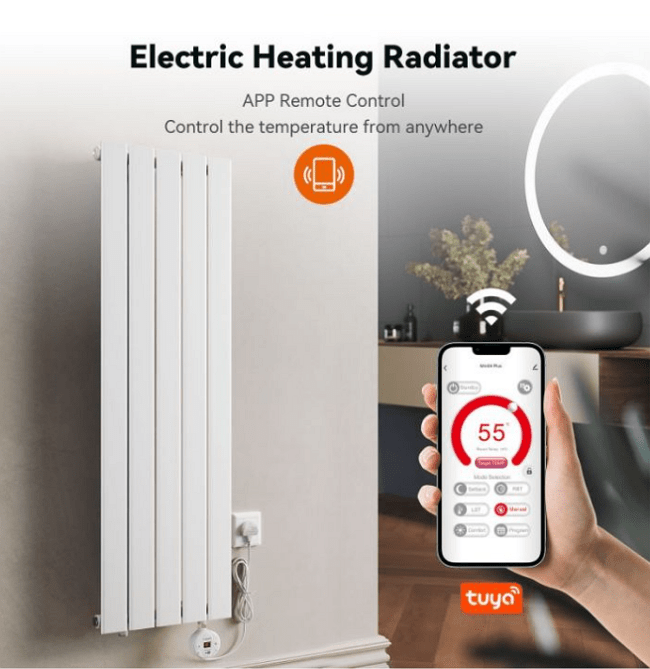
Future-Proofing Your Heating System
Looking past 2025, hydrogen boilers are one option to replace natural gas longer-term. These can burn hydrogen gas or be “hydrogen-ready” via dual fuel configurations prepped for a future hydrogen supply infrastructure. But viable widescale hydrogen remains speculative.
Alternatively, electric radiators offer resiliency amid evolving energy policies. Investing in smart electric models provides lead time for enhancing insulation and home energy efficiency before fossil fuel bans take hold. This elevates electrical heating’s cost-effectiveness and performance as grids continue decarbonizing over 5+ year equipment lifecycles.
Future bans on natural gas to meet 2050 net-zero pledges indicate all homes require transition plans through heat pumps or electrification. Going electric now future-proofs households for deeper emissions cuts expected over decades. This prevents repeat boiler replacement costs down the line while government incentives sweeten affordable transitions today.
Radiator innovations like machine learning and user customization will also boost capabilities and value. Once higher purchase prices fall further, smart electric systems make sense for most UK homes based on annual savings potential, low maintenance plus longevity and insulation enhancement opportunities before fossil fuel heating disappears entirely post-2025. Getting ahead of the net-zero curve ensures heating bills and upgrade costs remain manageable.
Conclusion
As you can see, electric radiator systems increasingly beat gas on environmental and economic grounds whether you face new build heating decisions or have upcoming boiler replacement needs in an existing property.
Smaller, well-insulated urban flats and mid-sized suburban homes stand to realize the biggest savings based on lower energy demands and easier installs under 2025 emission policies. Larger or off-grid rural properties may still benefit from heat pumps over renovating gas infrastructure whose days are numbered in Britain.
Visit Elegant Showers UK Online Shop for help finding the most affordable electric radiators or water heating solutions fitting your unique home needs today through 2025 and beyond. Our professional consultants keep up with the latest governmental incentive programs while providing reliable advice for maximizing long-term savings as natural gas falls out of favor. Partnering with the right electric heating experts now brings peace of mind that your system investment stays cost-effective and compliant with evolving environmental regulations for years to come.


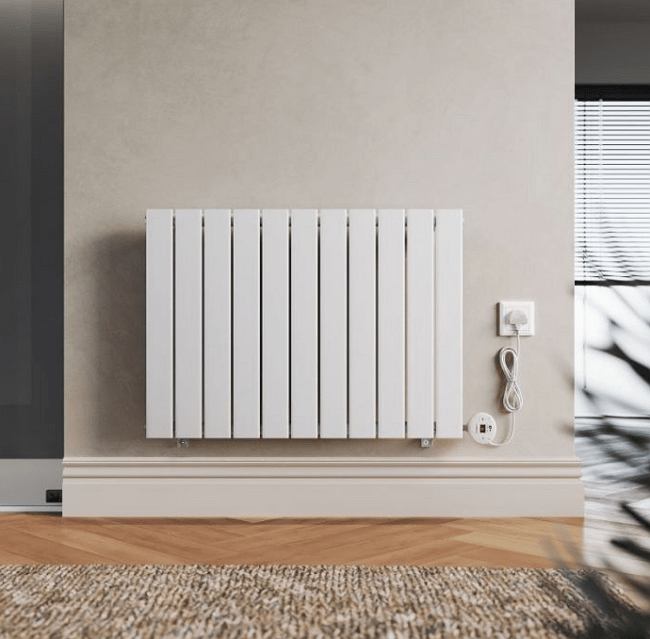
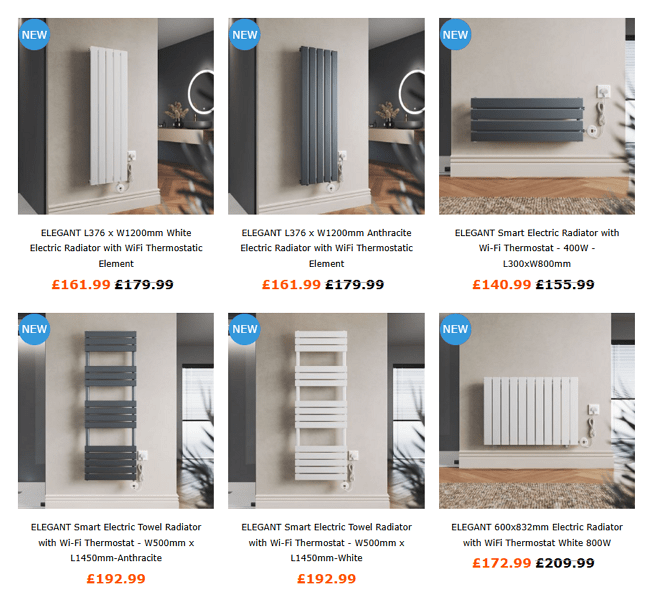
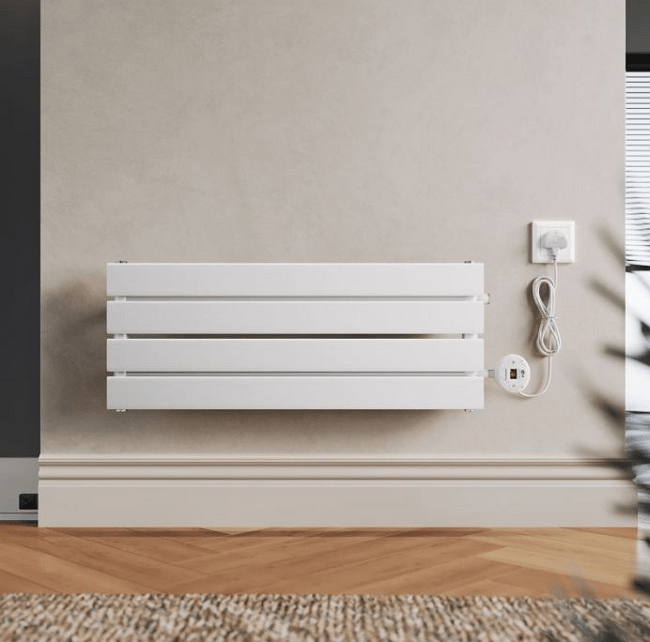
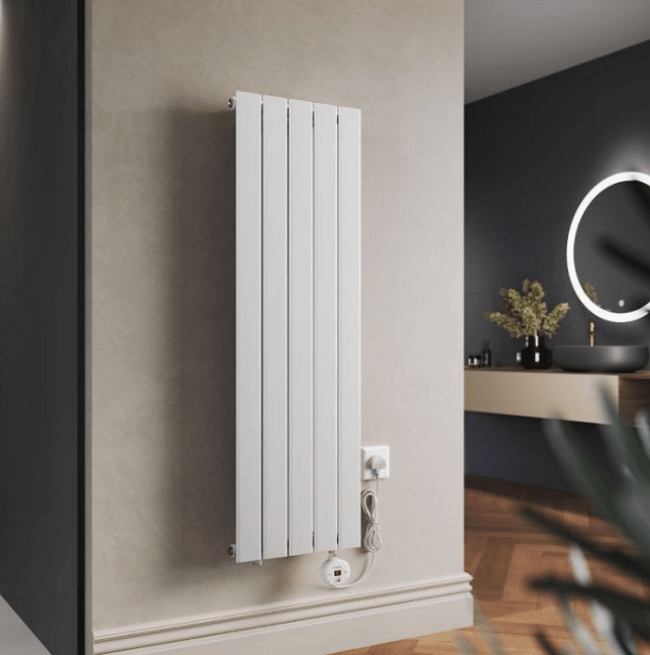


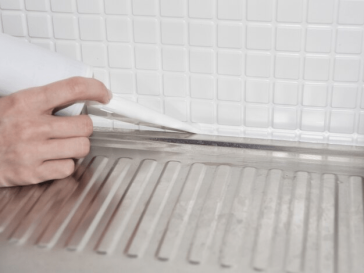
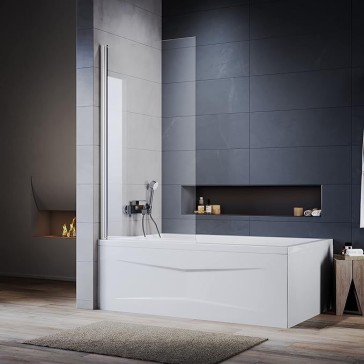
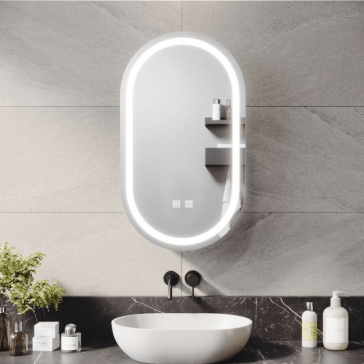

Validate your login